4th Joint Training Program on Science, Technology & Innovation Policy and Instruments for Sustainable Development for the Belt and Road Countries
Go Back

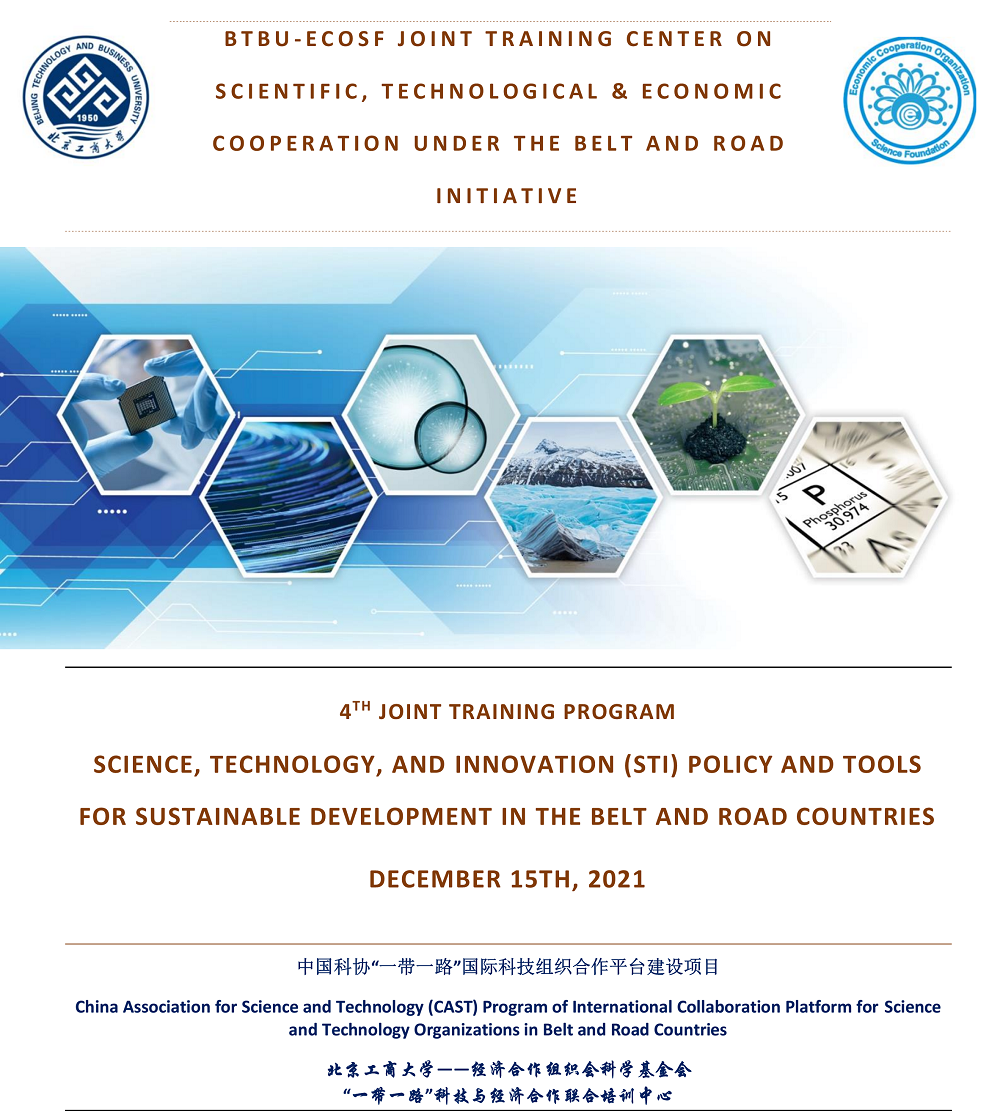
Background
BTBU-ECOSF Joint Training Center with support of China Association for Science and Technology (CAST) organized the 4th joint Training Program on “Science, Technology, and Innovation (STI) Policy and Tools for Sustainable Development in the Belt and Road Countries” on December 15th, 2021. The training was held virtually through Zoom and attracted participation of over 100 participants from 20 countries, particularly from the ECO Member Countries. Engr. Khalil Raza Scientific Officer – ECOSF moderated the training session and generated a meaningful dialogue on the subject. A number of STI experts from China, Iran, and Pakistan participated as resource persons.
The 4th Training Program on STI Policy and Tools was aimed at engaging participants in enhancing their understanding on existing approaches, case studies and national experiences in establishing and managing STI policies with reference to innovation system reforms, STI parks and other essential tools. The objective of the short on-line training session by BTBU-ECOSF Joint Training Center was to build awareness and understanding concerning key aspects of STI policies and instruments, as well as innovation and entrepreneurship processes and how they relate to the SDGs. This report contains brief highlights, and the key messages of the expert trainers as provided in the succeeding sections. The detailed Power Point Presentations (PPTs) of the expert trainers are annexed towards the end of this report.
Training Objectives
The virtual training session provided an opportunity to STI policymakers, researchers, and managers to introduce various theories and practices of STI policy tools in the context of Belt and Road Initiative.
The experts/resource persons delivered their lectures on the following specific objectives:
- Share knowledge and practices using different methodological approaches to policy- making and implementation of STI policies
- Recognize the importance of transparent, participatory, inclusive, and evidence-based STI policy-making processes
- Understand the importance of establishing appropriate and well-balanced policy mix of instruments and means that address the global challenges
- Appreciate the need to support innovation and entrepreneurship through government support, financing etc.
Role of STI Policy and Tools for Sustainable Development
The resource persons underlined that the STI policy has played a significant role in the economic transformation of many nations. STI policies have enabled structural transformations and the long-term productivity growth needed to sustain economic development. In the Asia-Pacific region, this is particularly true for Japan, the Republic of Korea and Singapore, and recently in China. These four countries have undergone rapid economic transformations in the recent decades. Significant advances as a result of STI policies have placed these countries at the forefront of innovation.
Hence, experts emphasized that many regions and countries need to build capacity in STI policy in order to strengthen their national STI systems and foster STI for addressing the pressing health, economic and social challenges of the pandemic crisis, especially for the Belt and Road countries.
Prof. Dr. Manzoor Hussain Soomro, President ECOSF in his welcome remarks emphasized that Science, Engineering, Technology, and Innovation (SETI) play a critical role in providing policy instruments that are essential to develop strong base of countries. Prof. Soomro underlined that it is important to deliberate on the adequate framework and strategies to develop the STI policies as a powerful governing tool which can reshape and alter the course of direction towards a high economic growth trajectory for the Belt and Road countries.
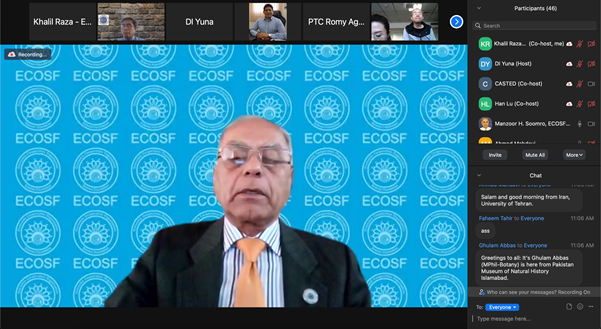
Prof. Soomro underscored that BRI of China commits to foster the industrial development with strong technical cooperation in many fields, including sustainable energy, infrastructure development, emerging technologies, and smart cities or transport etc. To achieve these massive goals, it requires a robust commitment to support science and engineering, including the capacity building and human resource development, Prof. Soomro remarked.
Dr. Bi Lianliang, Associate Researcher, Institute of International Science and Technology Relations, Chinese Academy of Science and Technology for Development (CASTED) presented her lecture on “The Policy Framework for STI in National High-Tech Zones of China”. Dr. Lianliang highlighted that China has effectively utilized the Science Parks and National High-Tech Zones (NHZs) as important carriers and tools of economic growth. Currently, China leads the world in terms of one of the highest numbers of successful science parks and high-tech zones. China first recognized the important role of science parks in 1988, whereby the State Council of China determined to include NHZ in its development agenda through its (China’s) “Torch Program”. At present, China has over 169 National and 50 Provincial High-Tech Zones.
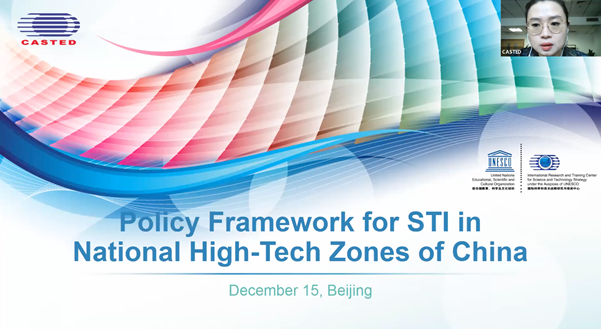
Dr. Bi further underlined that NHZs have contributed immensely as an important pillar to the Chinese national economy. Over the last 30 years, NHZs have contributed upwards of 11% of the China’s GDP with cumulative net exports of over 20%.
She also highlighted the key lessons of China’s Science Parks; which are grounded on four principles; (a) NHZ are recognized as an important part of national strategy and well protected by laws, master plans and policies, (b) these are financially independent with taxation and fiscal right (c) local governments play a key role in their administration and management with right set of policy incentives and tools to boos innovation and (d) these zones are first piloted at small scales and then they are gradually scaled up and replicated in other parts of china.
Dr. Li Yan, Associate Researcher of Chinese Academy of Science and Technology for Development (CASTED) delivered his presentation on China’s S&T System Reforms. Dr. Yan presented the historical background and current administrative framework of the China’s S&T system. He highlighted that since its independence, China had a strong political will to drive and uplift the S&T sector. As a result, several institutions and strategic initiatives were built and undertaken to strengthen the S&T system in China. Dr. Yan also presented the Implementation Plan of Science and Technology System Reform which has been adopted by State Council of China in 2015. In this plan, there are 143 measures which aim to provide a foundation for S&T reforms in the following directions:
- Promote market-oriented mechanism of technological innovation and development to insure inclusive participation of key stakeholders in the S&T planning. Historically, S&T planning has been primarily undertaken by the state institutions with negligible feedback from enterprises. Hence, this plan concentrated on encouraging the participation of entrepreneurs and enterprises in the S&T planning and programming.
- De-bureaucratize the research institutes to promote innovative research in the R&D institutions
- Encourage personnel cultivation, and incentivize creativity and critical thinking, and reward scientists and researchers who are making meaningful impact through their research in the society.
- Promote entrepreneurship and bring in adequate financing for commercialization of scientific and technological research and strategize the pathways for process of Laboratory to Market etc.
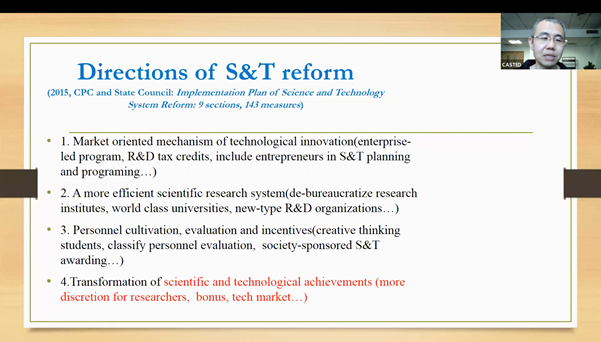
Prof. Dr. Dr. Arabella Bhutto Co-director of the Mehran University Institute of Science & Technology Development (MUISTD), Pakistan delivered her lecture on the STI Policy Framework in Pakistan. She presented the historical account of Pakistan’s STI policies since its independence. Pakistan adopted its first ever National STI policy in 1984, which emphasized on technological development appropriate to the national needs and it served as the foundation for improving S&T research in the country. One of the major outcomes of this policy initiative was establishment of the STI governance structure, which played a primary role in devising the institutional framework to drive S&T development in the country.
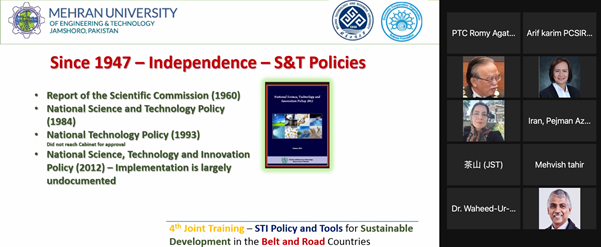
Later in 2012, Pakistan introduced another National STI Policy, however, the policy did not produce promising outcomes as result of its weak implementation framework. Prof. Bhutto underlined the gaps that exist in the implementation of the STI policy framework in Pakistan. Although, Pakistan began with an appropriate agenda setting for STI in its early years of development and in response, various policies were formulated but they were never formally adopted and implemented. Prof. Bhutto highlighted a few major reasons as to why these STI policies in Pakistan have not been able to deliver on their objectives, which include;
- Inconsistency in roadmaps or action plans
- No allocation of adequate funds for implementation of relevant S&T measures
- Lack of institutional capacities at major S&T organizations and
- Misalignment of S&T agenda with national development goals
- Lack of monitoring and evaluation framework
Prof. Bhutto underscored that Pakistan is in the process of developing another STI Policy this year in 2021 and the draft policy document has already been developed in consultation with stakeholders. This draft STI policy 2021 aims to address four key areas of sustainable development, including basic human needs, good governance, economic development and quality of life.
Ms. Mozhgan Yazdianpour, Director of International Cooperation of Isfahan Regional Center for Technology Incubators and Science Park Development (IRIS), delivered her presentation on STI Policy and Science and Technology Parks in Iran. Ms. Yazdianpour highlighted that STI policy has played a very important role in the national economic development of Iran. She highlighted the role of National Innovation System in Iran and its framework which is supported by several important layers and institutions of the Government, including the Vice Presidency on S&T and the Supreme Council of Science, Research and Technology.
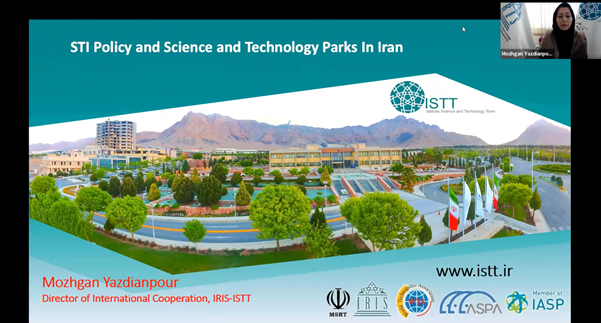
Ms. Mozhgan further highlighted the role of Science and Technology Parks in Iran with their prime objective to promote knowledge based economic development by supporting innovative companies, fostering entrepreneurial values and culture, and providing a platform for collaborative work amongst enterprise, universities, market, and the industry. Government of Iran has strategic focus on strengthening and development of S&T Parks in Iran. Currently, there are over 48 STI parks in Iran which generated 300,000 jobs at an operating revenue of over US$ 6 billion with a total export value of US$ 1 billion in the year 2020. Ms. Mozhghan concluded that STI parks will continue to play an instrumental role in transforming Iran’s oil-based economy to a more diverse knowledge-based economy.
Prof. Dr. Tassaduq Hussain, Dean Faculty of Computing and IT at the University of Sialkot delivered his lecture on unlocking Sialkot’s potential as industrial cluster for accelerated economic and industrial growth in Pakistan. Prof. Tassaduq demonstrated the strengths of Sialkot as a model important economic and industrial hub city of the country. Through exports, Sialkot-based small and medium industries are earning foreign exchange amounting to more than $2.5 billion annually to strengthen the national exchequer. He presented a framework, whereby Sialkot could further boost its exports through STI Parks.
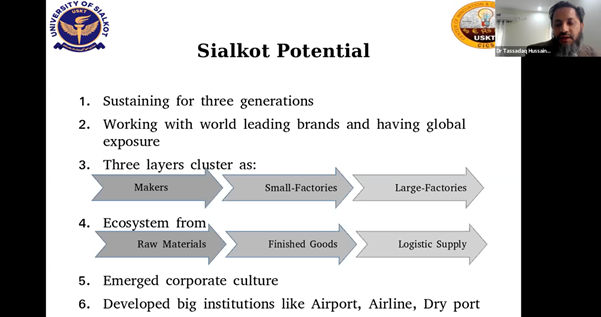
Prof. Dr. Dandan Xu Vice President, Beijing Technological and Business University (BTBU) gave her closing remarks towards the end of training workshop. Prof. Xu concluded that transformative powers of Science, Technology and Innovation will be at the heart of sustainable economic growth in the Belt and Road region. Prof. Xu paid her gratitude to the expert trainers from Iran, Pakistan, and China for delivering important and resourceful training for the audience. She assured robust cooperation and collaboration will continue by the Joint Training Center to achieve the intended goals and promote STI in the belt and road region.
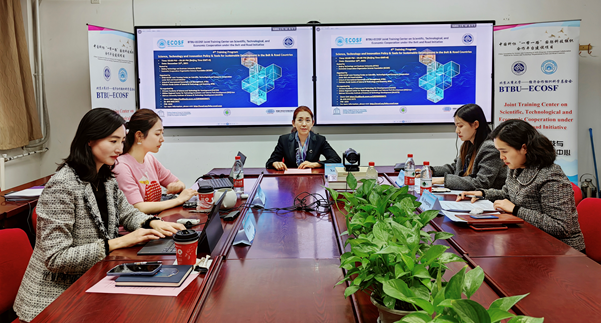
About the BTBU-ECOSF Joint Training Center
The Belt and Road Initiative (BRI) is a massive global initiative aimed at connecting international trading partners in the east and the west. The BRI offers a tremendous potential to spur a new era of trade, economic and industrial growth for the countries in the Asia and beyond. In order to maximize the benefits of BRI, the participating countries require to develop adequate technological workforce and engage in an alliance for promotion of cross-border cooperation in the Science, Technology, and Innovation (STI) sectors.
Appreciating this need for skill development and capacity building in key economic sectors, the Beijing Technological and Business University (BTBU) and the Economic Cooperation Organization Science Foundation (ECOSF) collaborated and launched the BTBU-ECOSF Joint Training Center on Scientific, Technological and Economic Cooperation under Belt and Road Initiative in September 2020. The Center has won the financial support of China Association for Science and Technology (CAST) Program of International Collaboration Platform for Science and Technology Organizations in Belt and Road Countries.
BTBU is renowned as a one of the leading high-level research universities in Beijing. Having long been committed to promoting substantive exchanges and exchanges with overseas first-class universities and academic institutions, BTBU has achieved meaningful results in international exchanges and cooperation, personnel training, academic research, etc.
ECOSF is the specialized agency of the Economic Cooperation Organization (ECO), an intergovernmental organization for scientific and technological cooperation, with its 10-member states (Afghanistan, Azerbaijan, Iran, Kazakhstan, Kyrgyzstan, Pakistan, Tajikistan, Turkey, Turkmenistan, Uzbekistan). ECOSF has an extensive exchange and cooperation network with international scientific and technological organizations in Asia-Pacific, Africa, Europe, and other regions, as well as other international organizations.
BTBU-ECOSF Joint Training Center aims to promote the sustainable economic and social development of BRI countries through training in the fields of technology application, industrial economics, S&T standards, and science communication.
Click here to view the complete report.
The recorded video of the event is provided below: